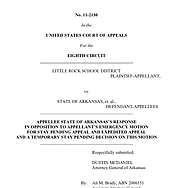LITTLE ROCK — The Little Rock School District will not be harmed if a federal appeals court refuses to temporarily stop a judge’s order to end the state’s obligation to pay it millions of dollars in desegregation funding and to expedite an appeal of that ruling, the Arkansas attorney general’s office said in a court filing Thursday.
Assistant Attorney General Ali Brady, responding on behalf of Attorney General Dustin McDaniel, asked the 8th U.S. Circuit Court of Appeals in St. Louis to deny the district’s request for a stay of U.S. District Judge Brian Miller’s May 19 decision to end most of the funding requirements.
The Little Rock School District also asked for an expedited timeline for appeal of that ruling.
“There is absolutely no need, nor any likelihood, that any Little Rock school will be forced to close, that mass layoffs will occur, or that the plans of students and their parents for next year will be disrupted,” the filing said. “Those things will only happen if [the district] itself chooses such a course of action rather than a more prudent approach.”
The state pays nearly $70 million annually to the Little Rock, Pulaski County Special and North Little Rock school districts as a requirement of a 1989 settlement in the 28-year-old Pulaski County school-desegregation case.
The Little Rock district’s attorneys, Chris Heller and Clay Fendley, have argued that abruptly lifting the funds would put the Little Rock district in peril, potentially forcing it to close magnet schools and lay off teachers.
In his request for an expe- dited appeal, Heller argued that Miller’s ruling could cost the district $38 million for the 2011-12 school year, more than 10 percent of its budget. The state pays half the education costs and all transportation costs for children enrolled in the six special-program magnet schools.
The attorney general’s filing said the district receives a per-pupil average of $9,396 of unrestricted state and local funding without the desegregation funds, almost $2,000 more than the statewide average of $7,489. The district’s budget plans for a year-end fund balance of more than $21 million, it said.
Gov. Mike Beebe said Thursday that the district is taking an “all or nothing” approach in its arguments.
State officials regularly hear from taxpayers and representatives of the state’s other school districts who argue the funding “was never intended to go on forever,” he said.
“If it’s worked then we don’t need to continue,” Beebe said. “If it hasn’t worked after 25 years, we don’t need to continue it.”
McDaniel’s filing asks the appeals court not to issue a stay, allowing Miller to make that decision.
Heller and Fendley filed the request with the appeals court at 8 p.m. Wednesday after Miller rejected their request to quickly decide on a stay, the state filing said.
The district on Tuesday asked Miller to decide by today whether he would require the state to continue making the payments until the appeal is complete.
Miller released the state last Thursday from its obligation to pay most of its desegregation aid to the Pulaski County Special, Little Rock and North Little Rock school districts, saying in his 110-page order that the funding provided a disincentive for the districts to meet their desegregation goals.
Under the judge’s order, the state remains responsible for funding the majority-to minority interdistrict student-transfer program. But Miller directed the districts to submit legal briefs within 30 days to show why the transfer program’s funding should not also stop.
Miller’s decision on the funding was incorporated with a ruling that declared the North Little Rock and Pulaski County Special districts partially unitary, or desegregated. Little Rock was declared unitary in 2009.
The court “abused its discretion” in that ruling, which came without arguments or briefs related to the funding and without the state’s request to lift the obligation, Heller and Fendley wrote.
The expedited timeline calls for all briefs and responses to be filed by June 24 with oral arguments beginning as soon as possible.
Past decisions in the case have taken more than a year to complete, Heller said Thursday. The expedited request anticipates a decision after about a month of litigation.
“I don’t understand the argument that there’s no urgency here,” he said.
The board of the Pulaski County Special School District authorized its attorneys Wednesday to join in the appeal. The North Little Rock School Board has not yet determined how it will respond to Miller’s ruling.
Arkansas, Pages 11 on 05/25/2011
